BO1BLAW204 Business Law: Contract Termination and Liability Scenarios
VerifiedAdded on 2023/04/23
|8
|1857
|121
Case Study
AI Summary
This case study delves into two distinct legal issues within the realm of Australian Business Law. The first issue examines whether Kent Institute Australia (KIA) can terminate Professor Berlin's contract due to an unforeseen accident that delays her joining date, analyzing the principle of frustration of contract. It concludes that KIA can indeed terminate the contract without liability. The second issue explores whether Repairer Pty Ltd is liable for the financial loss incurred by KIA due to damaged and undelivered ovens, impacting a planned training course. The analysis considers the role of a third-party carrier and a worker's strike, ultimately concluding that Repairer Pty Ltd and the independent carrier are liable for damages to KIA due to their respective failures in fulfilling the contractual obligations. Desklib offers students access to similar solved assignments and past papers for effective study.
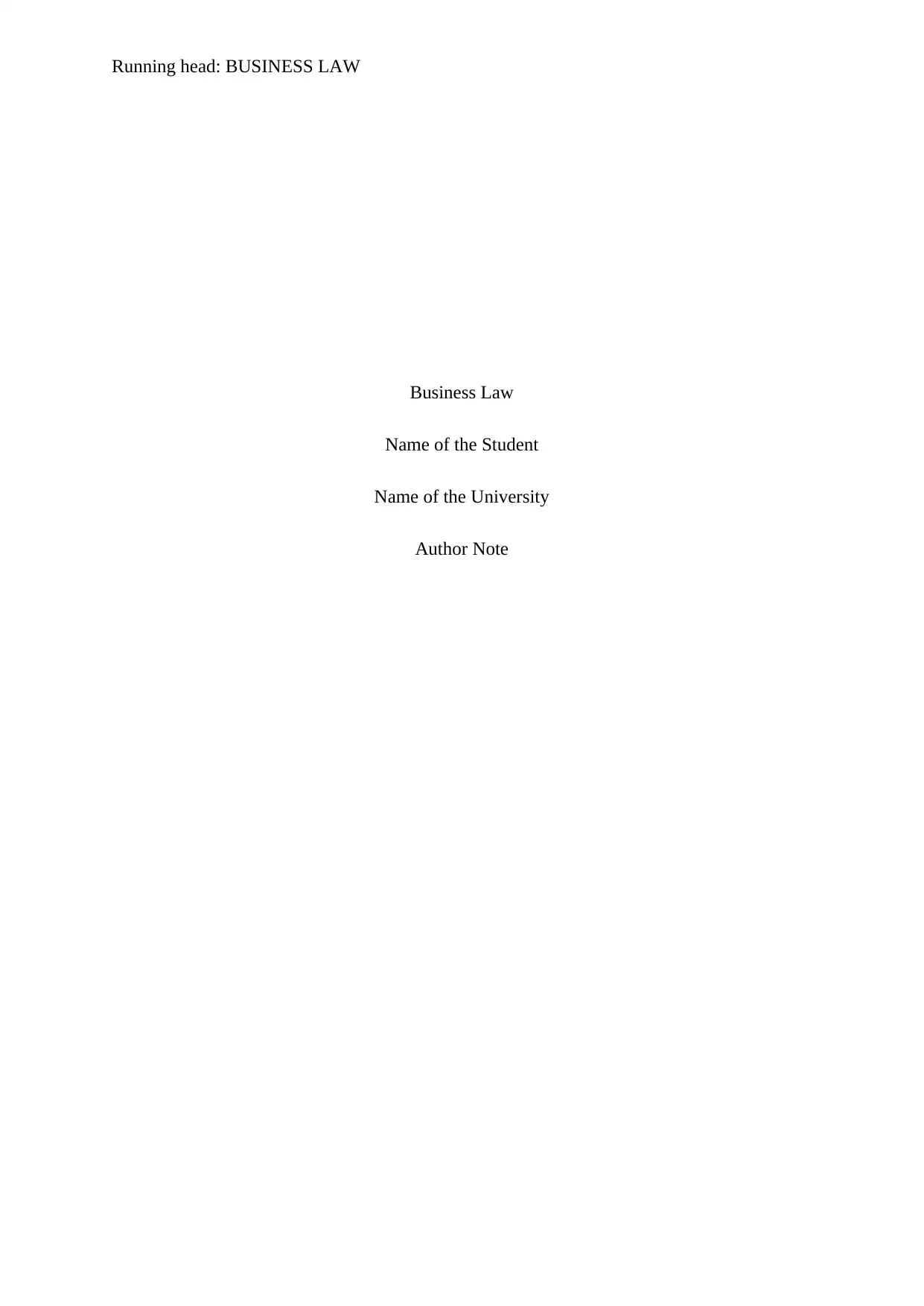
Running head: BUSINESS LAW
Business Law
Name of the Student
Name of the University
Author Note
Business Law
Name of the Student
Name of the University
Author Note
Paraphrase This Document
Need a fresh take? Get an instant paraphrase of this document with our AI Paraphraser
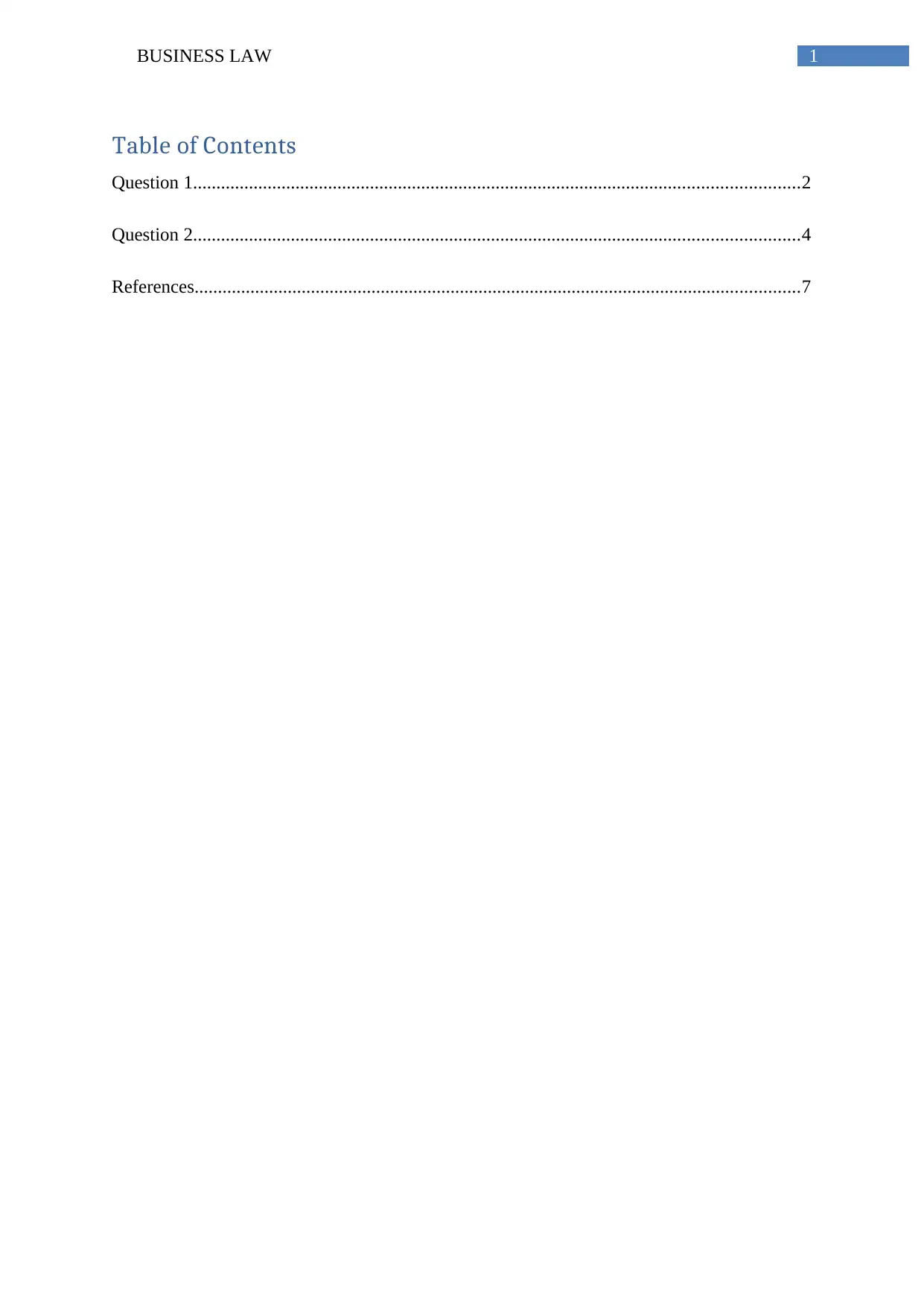
1BUSINESS LAW
Table of Contents
Question 1..................................................................................................................................2
Question 2..................................................................................................................................4
References..................................................................................................................................7
Table of Contents
Question 1..................................................................................................................................2
Question 2..................................................................................................................................4
References..................................................................................................................................7
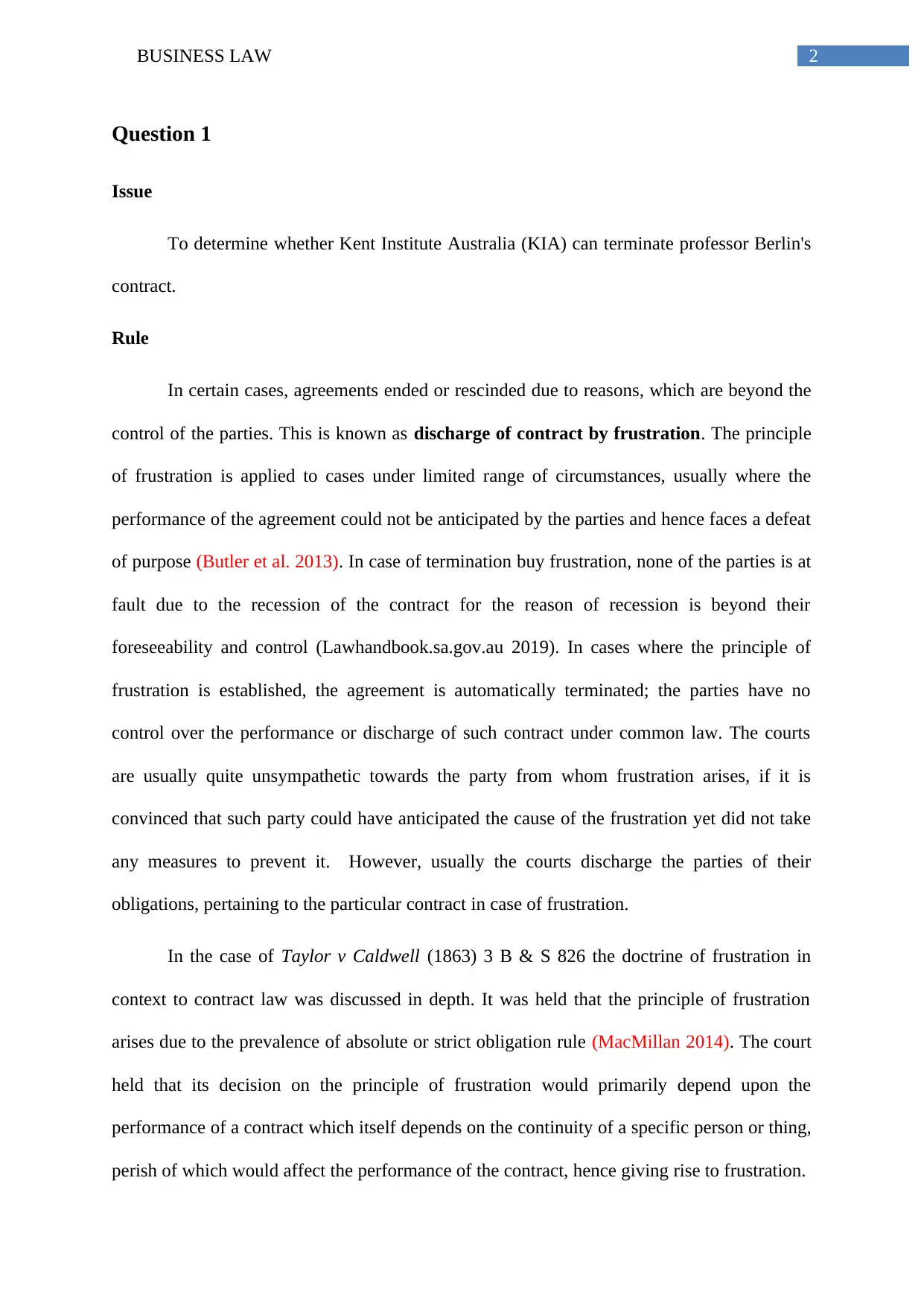
2BUSINESS LAW
Question 1
Issue
To determine whether Kent Institute Australia (KIA) can terminate professor Berlin's
contract.
Rule
In certain cases, agreements ended or rescinded due to reasons, which are beyond the
control of the parties. This is known as discharge of contract by frustration. The principle
of frustration is applied to cases under limited range of circumstances, usually where the
performance of the agreement could not be anticipated by the parties and hence faces a defeat
of purpose (Butler et al. 2013). In case of termination buy frustration, none of the parties is at
fault due to the recession of the contract for the reason of recession is beyond their
foreseeability and control (Lawhandbook.sa.gov.au 2019). In cases where the principle of
frustration is established, the agreement is automatically terminated; the parties have no
control over the performance or discharge of such contract under common law. The courts
are usually quite unsympathetic towards the party from whom frustration arises, if it is
convinced that such party could have anticipated the cause of the frustration yet did not take
any measures to prevent it. However, usually the courts discharge the parties of their
obligations, pertaining to the particular contract in case of frustration.
In the case of Taylor v Caldwell (1863) 3 B & S 826 the doctrine of frustration in
context to contract law was discussed in depth. It was held that the principle of frustration
arises due to the prevalence of absolute or strict obligation rule (MacMillan 2014). The court
held that its decision on the principle of frustration would primarily depend upon the
performance of a contract which itself depends on the continuity of a specific person or thing,
perish of which would affect the performance of the contract, hence giving rise to frustration.
Question 1
Issue
To determine whether Kent Institute Australia (KIA) can terminate professor Berlin's
contract.
Rule
In certain cases, agreements ended or rescinded due to reasons, which are beyond the
control of the parties. This is known as discharge of contract by frustration. The principle
of frustration is applied to cases under limited range of circumstances, usually where the
performance of the agreement could not be anticipated by the parties and hence faces a defeat
of purpose (Butler et al. 2013). In case of termination buy frustration, none of the parties is at
fault due to the recession of the contract for the reason of recession is beyond their
foreseeability and control (Lawhandbook.sa.gov.au 2019). In cases where the principle of
frustration is established, the agreement is automatically terminated; the parties have no
control over the performance or discharge of such contract under common law. The courts
are usually quite unsympathetic towards the party from whom frustration arises, if it is
convinced that such party could have anticipated the cause of the frustration yet did not take
any measures to prevent it. However, usually the courts discharge the parties of their
obligations, pertaining to the particular contract in case of frustration.
In the case of Taylor v Caldwell (1863) 3 B & S 826 the doctrine of frustration in
context to contract law was discussed in depth. It was held that the principle of frustration
arises due to the prevalence of absolute or strict obligation rule (MacMillan 2014). The court
held that its decision on the principle of frustration would primarily depend upon the
performance of a contract which itself depends on the continuity of a specific person or thing,
perish of which would affect the performance of the contract, hence giving rise to frustration.
⊘ This is a preview!⊘
Do you want full access?
Subscribe today to unlock all pages.

Trusted by 1+ million students worldwide
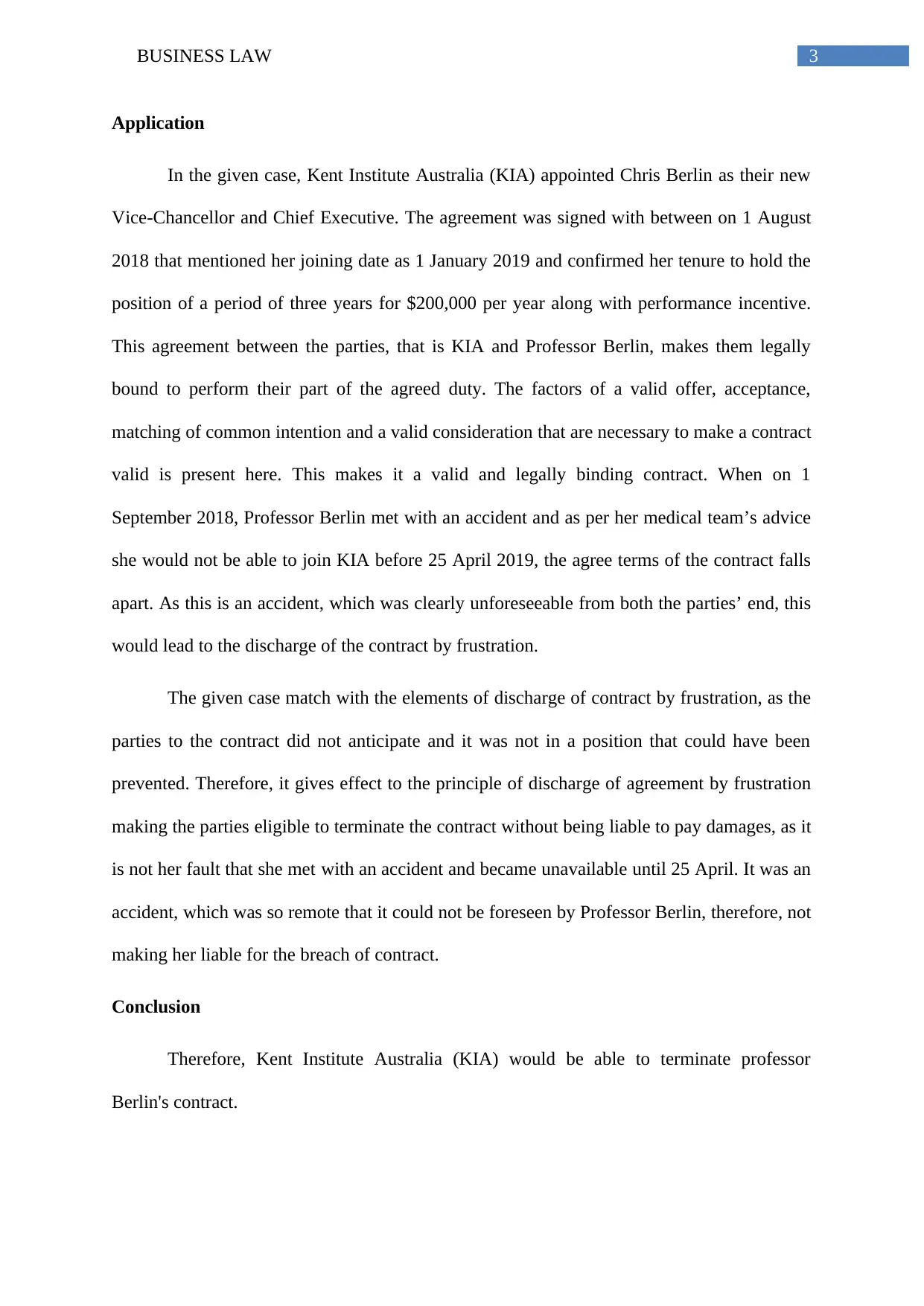
3BUSINESS LAW
Application
In the given case, Kent Institute Australia (KIA) appointed Chris Berlin as their new
Vice-Chancellor and Chief Executive. The agreement was signed with between on 1 August
2018 that mentioned her joining date as 1 January 2019 and confirmed her tenure to hold the
position of a period of three years for $200,000 per year along with performance incentive.
This agreement between the parties, that is KIA and Professor Berlin, makes them legally
bound to perform their part of the agreed duty. The factors of a valid offer, acceptance,
matching of common intention and a valid consideration that are necessary to make a contract
valid is present here. This makes it a valid and legally binding contract. When on 1
September 2018, Professor Berlin met with an accident and as per her medical team’s advice
she would not be able to join KIA before 25 April 2019, the agree terms of the contract falls
apart. As this is an accident, which was clearly unforeseeable from both the parties’ end, this
would lead to the discharge of the contract by frustration.
The given case match with the elements of discharge of contract by frustration, as the
parties to the contract did not anticipate and it was not in a position that could have been
prevented. Therefore, it gives effect to the principle of discharge of agreement by frustration
making the parties eligible to terminate the contract without being liable to pay damages, as it
is not her fault that she met with an accident and became unavailable until 25 April. It was an
accident, which was so remote that it could not be foreseen by Professor Berlin, therefore, not
making her liable for the breach of contract.
Conclusion
Therefore, Kent Institute Australia (KIA) would be able to terminate professor
Berlin's contract.
Application
In the given case, Kent Institute Australia (KIA) appointed Chris Berlin as their new
Vice-Chancellor and Chief Executive. The agreement was signed with between on 1 August
2018 that mentioned her joining date as 1 January 2019 and confirmed her tenure to hold the
position of a period of three years for $200,000 per year along with performance incentive.
This agreement between the parties, that is KIA and Professor Berlin, makes them legally
bound to perform their part of the agreed duty. The factors of a valid offer, acceptance,
matching of common intention and a valid consideration that are necessary to make a contract
valid is present here. This makes it a valid and legally binding contract. When on 1
September 2018, Professor Berlin met with an accident and as per her medical team’s advice
she would not be able to join KIA before 25 April 2019, the agree terms of the contract falls
apart. As this is an accident, which was clearly unforeseeable from both the parties’ end, this
would lead to the discharge of the contract by frustration.
The given case match with the elements of discharge of contract by frustration, as the
parties to the contract did not anticipate and it was not in a position that could have been
prevented. Therefore, it gives effect to the principle of discharge of agreement by frustration
making the parties eligible to terminate the contract without being liable to pay damages, as it
is not her fault that she met with an accident and became unavailable until 25 April. It was an
accident, which was so remote that it could not be foreseen by Professor Berlin, therefore, not
making her liable for the breach of contract.
Conclusion
Therefore, Kent Institute Australia (KIA) would be able to terminate professor
Berlin's contract.
Paraphrase This Document
Need a fresh take? Get an instant paraphrase of this document with our AI Paraphraser
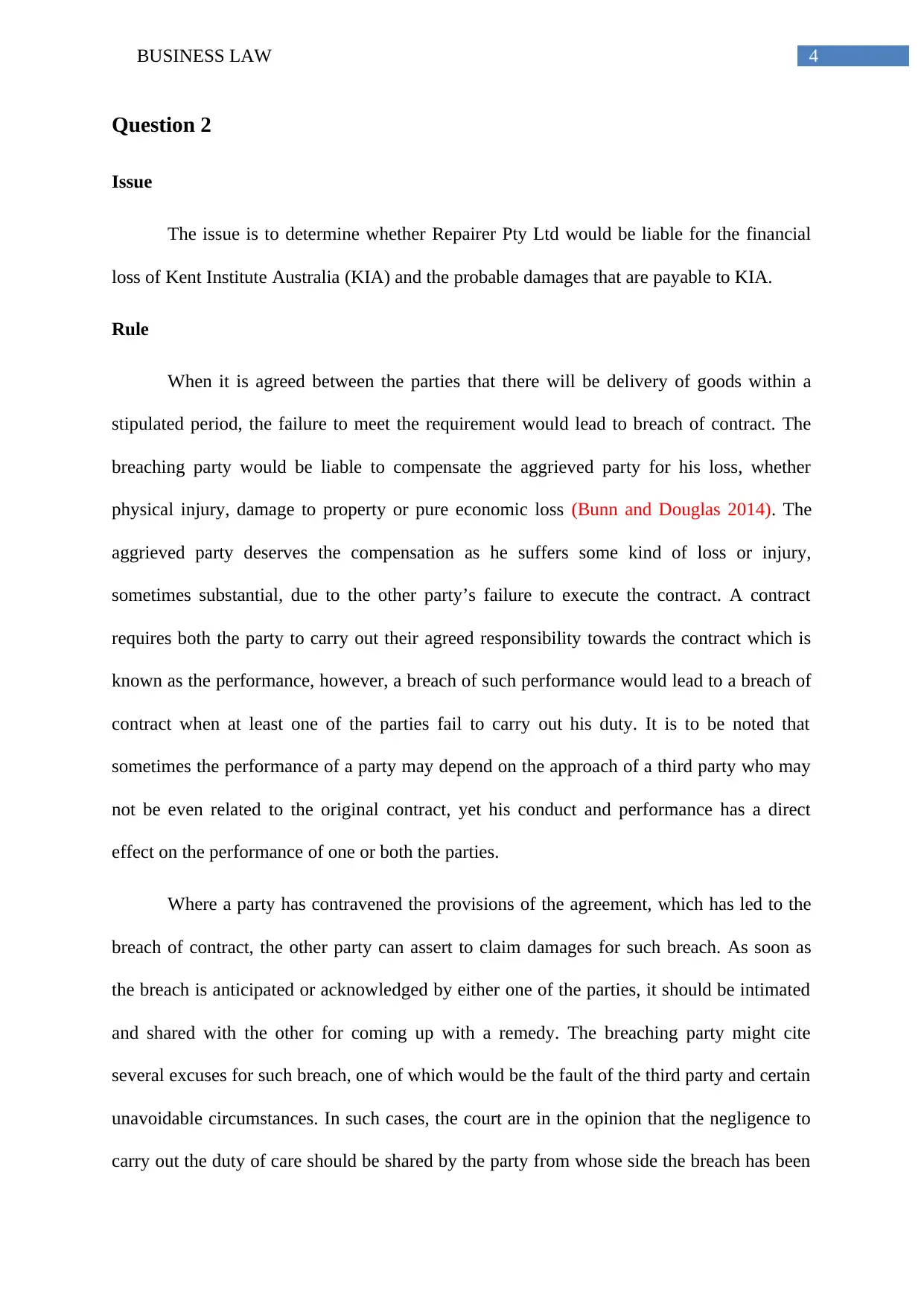
4BUSINESS LAW
Question 2
Issue
The issue is to determine whether Repairer Pty Ltd would be liable for the financial
loss of Kent Institute Australia (KIA) and the probable damages that are payable to KIA.
Rule
When it is agreed between the parties that there will be delivery of goods within a
stipulated period, the failure to meet the requirement would lead to breach of contract. The
breaching party would be liable to compensate the aggrieved party for his loss, whether
physical injury, damage to property or pure economic loss (Bunn and Douglas 2014). The
aggrieved party deserves the compensation as he suffers some kind of loss or injury,
sometimes substantial, due to the other party’s failure to execute the contract. A contract
requires both the party to carry out their agreed responsibility towards the contract which is
known as the performance, however, a breach of such performance would lead to a breach of
contract when at least one of the parties fail to carry out his duty. It is to be noted that
sometimes the performance of a party may depend on the approach of a third party who may
not be even related to the original contract, yet his conduct and performance has a direct
effect on the performance of one or both the parties.
Where a party has contravened the provisions of the agreement, which has led to the
breach of contract, the other party can assert to claim damages for such breach. As soon as
the breach is anticipated or acknowledged by either one of the parties, it should be intimated
and shared with the other for coming up with a remedy. The breaching party might cite
several excuses for such breach, one of which would be the fault of the third party and certain
unavoidable circumstances. In such cases, the court are in the opinion that the negligence to
carry out the duty of care should be shared by the party from whose side the breach has been
Question 2
Issue
The issue is to determine whether Repairer Pty Ltd would be liable for the financial
loss of Kent Institute Australia (KIA) and the probable damages that are payable to KIA.
Rule
When it is agreed between the parties that there will be delivery of goods within a
stipulated period, the failure to meet the requirement would lead to breach of contract. The
breaching party would be liable to compensate the aggrieved party for his loss, whether
physical injury, damage to property or pure economic loss (Bunn and Douglas 2014). The
aggrieved party deserves the compensation as he suffers some kind of loss or injury,
sometimes substantial, due to the other party’s failure to execute the contract. A contract
requires both the party to carry out their agreed responsibility towards the contract which is
known as the performance, however, a breach of such performance would lead to a breach of
contract when at least one of the parties fail to carry out his duty. It is to be noted that
sometimes the performance of a party may depend on the approach of a third party who may
not be even related to the original contract, yet his conduct and performance has a direct
effect on the performance of one or both the parties.
Where a party has contravened the provisions of the agreement, which has led to the
breach of contract, the other party can assert to claim damages for such breach. As soon as
the breach is anticipated or acknowledged by either one of the parties, it should be intimated
and shared with the other for coming up with a remedy. The breaching party might cite
several excuses for such breach, one of which would be the fault of the third party and certain
unavoidable circumstances. In such cases, the court are in the opinion that the negligence to
carry out the duty of care should be shared by the party from whose side the breach has been
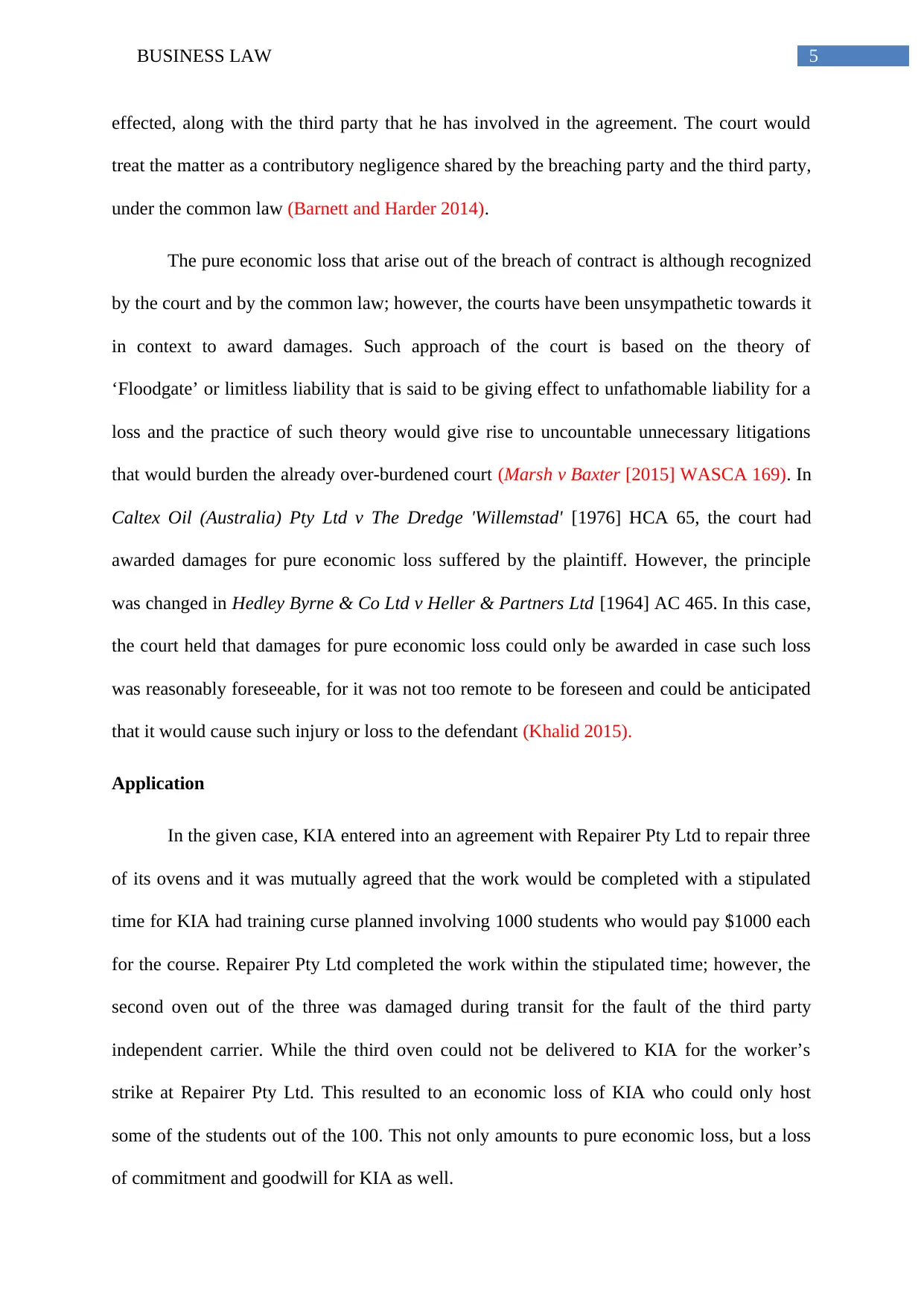
5BUSINESS LAW
effected, along with the third party that he has involved in the agreement. The court would
treat the matter as a contributory negligence shared by the breaching party and the third party,
under the common law (Barnett and Harder 2014).
The pure economic loss that arise out of the breach of contract is although recognized
by the court and by the common law; however, the courts have been unsympathetic towards it
in context to award damages. Such approach of the court is based on the theory of
‘Floodgate’ or limitless liability that is said to be giving effect to unfathomable liability for a
loss and the practice of such theory would give rise to uncountable unnecessary litigations
that would burden the already over-burdened court (Marsh v Baxter [2015] WASCA 169). In
Caltex Oil (Australia) Pty Ltd v The Dredge 'Willemstad' [1976] HCA 65, the court had
awarded damages for pure economic loss suffered by the plaintiff. However, the principle
was changed in Hedley Byrne & Co Ltd v Heller & Partners Ltd [1964] AC 465. In this case,
the court held that damages for pure economic loss could only be awarded in case such loss
was reasonably foreseeable, for it was not too remote to be foreseen and could be anticipated
that it would cause such injury or loss to the defendant (Khalid 2015).
Application
In the given case, KIA entered into an agreement with Repairer Pty Ltd to repair three
of its ovens and it was mutually agreed that the work would be completed with a stipulated
time for KIA had training curse planned involving 1000 students who would pay $1000 each
for the course. Repairer Pty Ltd completed the work within the stipulated time; however, the
second oven out of the three was damaged during transit for the fault of the third party
independent carrier. While the third oven could not be delivered to KIA for the worker’s
strike at Repairer Pty Ltd. This resulted to an economic loss of KIA who could only host
some of the students out of the 100. This not only amounts to pure economic loss, but a loss
of commitment and goodwill for KIA as well.
effected, along with the third party that he has involved in the agreement. The court would
treat the matter as a contributory negligence shared by the breaching party and the third party,
under the common law (Barnett and Harder 2014).
The pure economic loss that arise out of the breach of contract is although recognized
by the court and by the common law; however, the courts have been unsympathetic towards it
in context to award damages. Such approach of the court is based on the theory of
‘Floodgate’ or limitless liability that is said to be giving effect to unfathomable liability for a
loss and the practice of such theory would give rise to uncountable unnecessary litigations
that would burden the already over-burdened court (Marsh v Baxter [2015] WASCA 169). In
Caltex Oil (Australia) Pty Ltd v The Dredge 'Willemstad' [1976] HCA 65, the court had
awarded damages for pure economic loss suffered by the plaintiff. However, the principle
was changed in Hedley Byrne & Co Ltd v Heller & Partners Ltd [1964] AC 465. In this case,
the court held that damages for pure economic loss could only be awarded in case such loss
was reasonably foreseeable, for it was not too remote to be foreseen and could be anticipated
that it would cause such injury or loss to the defendant (Khalid 2015).
Application
In the given case, KIA entered into an agreement with Repairer Pty Ltd to repair three
of its ovens and it was mutually agreed that the work would be completed with a stipulated
time for KIA had training curse planned involving 1000 students who would pay $1000 each
for the course. Repairer Pty Ltd completed the work within the stipulated time; however, the
second oven out of the three was damaged during transit for the fault of the third party
independent carrier. While the third oven could not be delivered to KIA for the worker’s
strike at Repairer Pty Ltd. This resulted to an economic loss of KIA who could only host
some of the students out of the 100. This not only amounts to pure economic loss, but a loss
of commitment and goodwill for KIA as well.
⊘ This is a preview!⊘
Do you want full access?
Subscribe today to unlock all pages.

Trusted by 1+ million students worldwide
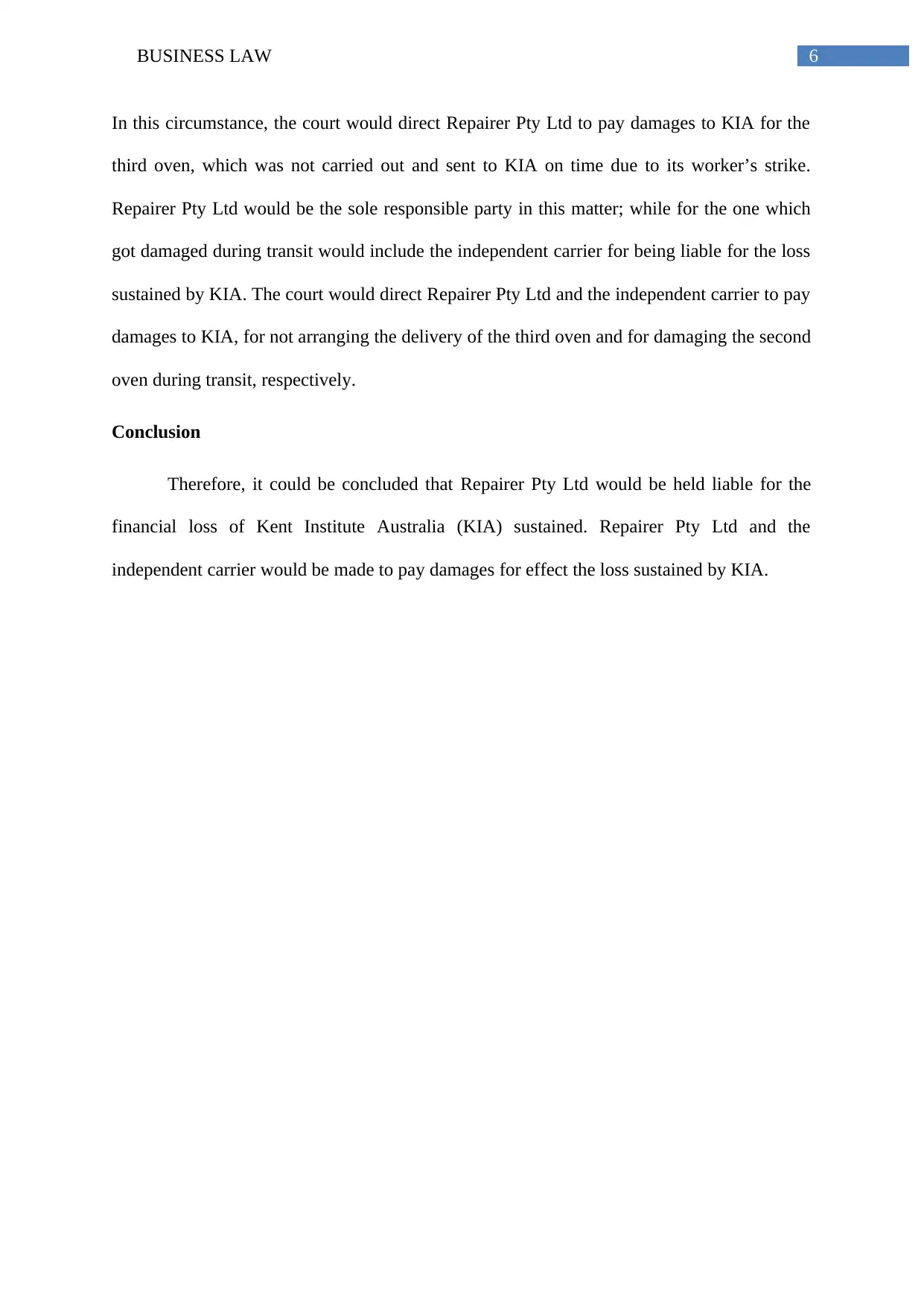
6BUSINESS LAW
In this circumstance, the court would direct Repairer Pty Ltd to pay damages to KIA for the
third oven, which was not carried out and sent to KIA on time due to its worker’s strike.
Repairer Pty Ltd would be the sole responsible party in this matter; while for the one which
got damaged during transit would include the independent carrier for being liable for the loss
sustained by KIA. The court would direct Repairer Pty Ltd and the independent carrier to pay
damages to KIA, for not arranging the delivery of the third oven and for damaging the second
oven during transit, respectively.
Conclusion
Therefore, it could be concluded that Repairer Pty Ltd would be held liable for the
financial loss of Kent Institute Australia (KIA) sustained. Repairer Pty Ltd and the
independent carrier would be made to pay damages for effect the loss sustained by KIA.
In this circumstance, the court would direct Repairer Pty Ltd to pay damages to KIA for the
third oven, which was not carried out and sent to KIA on time due to its worker’s strike.
Repairer Pty Ltd would be the sole responsible party in this matter; while for the one which
got damaged during transit would include the independent carrier for being liable for the loss
sustained by KIA. The court would direct Repairer Pty Ltd and the independent carrier to pay
damages to KIA, for not arranging the delivery of the third oven and for damaging the second
oven during transit, respectively.
Conclusion
Therefore, it could be concluded that Repairer Pty Ltd would be held liable for the
financial loss of Kent Institute Australia (KIA) sustained. Repairer Pty Ltd and the
independent carrier would be made to pay damages for effect the loss sustained by KIA.
Paraphrase This Document
Need a fresh take? Get an instant paraphrase of this document with our AI Paraphraser
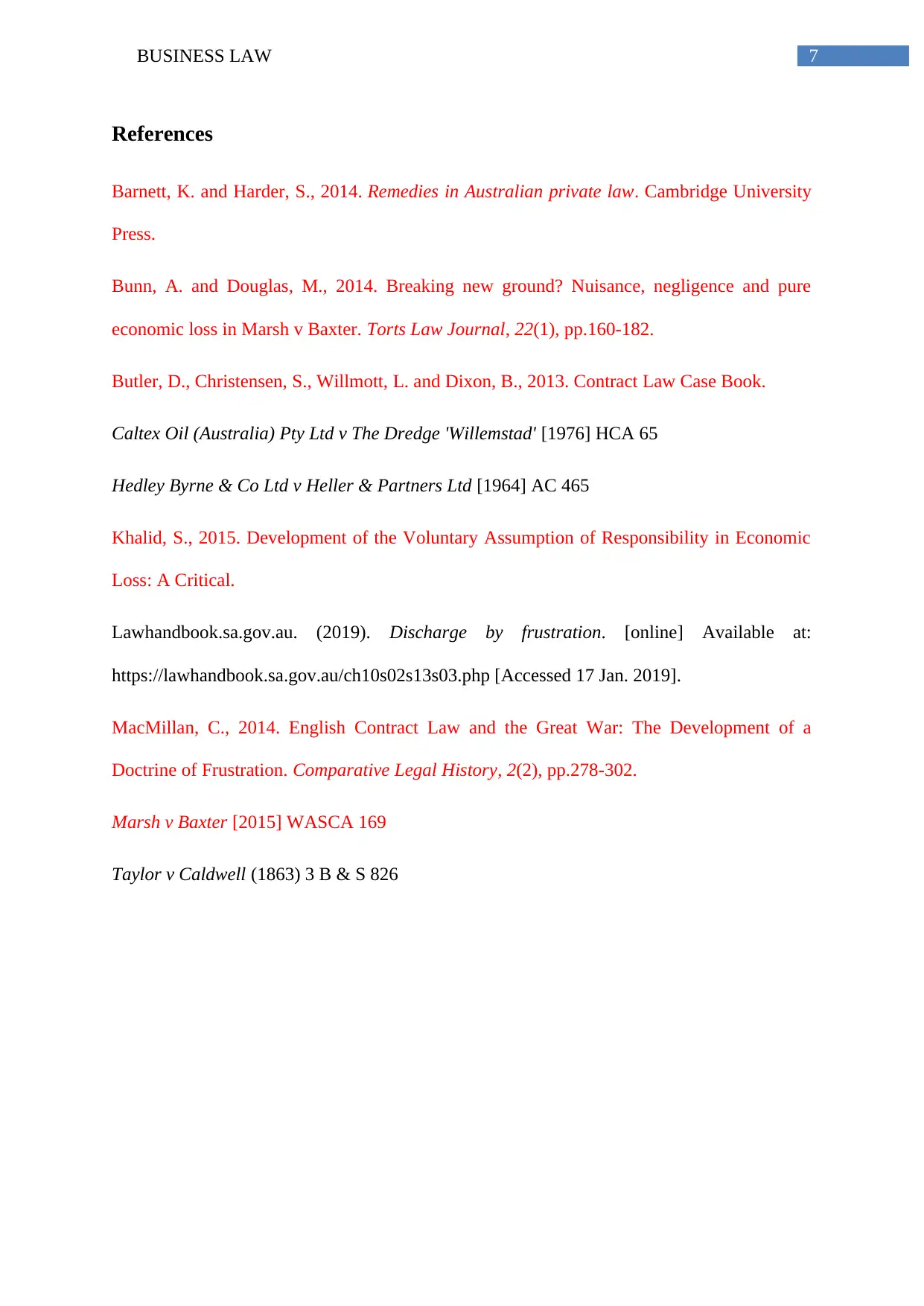
7BUSINESS LAW
References
Barnett, K. and Harder, S., 2014. Remedies in Australian private law. Cambridge University
Press.
Bunn, A. and Douglas, M., 2014. Breaking new ground? Nuisance, negligence and pure
economic loss in Marsh v Baxter. Torts Law Journal, 22(1), pp.160-182.
Butler, D., Christensen, S., Willmott, L. and Dixon, B., 2013. Contract Law Case Book.
Caltex Oil (Australia) Pty Ltd v The Dredge 'Willemstad' [1976] HCA 65
Hedley Byrne & Co Ltd v Heller & Partners Ltd [1964] AC 465
Khalid, S., 2015. Development of the Voluntary Assumption of Responsibility in Economic
Loss: A Critical.
Lawhandbook.sa.gov.au. (2019). Discharge by frustration. [online] Available at:
https://lawhandbook.sa.gov.au/ch10s02s13s03.php [Accessed 17 Jan. 2019].
MacMillan, C., 2014. English Contract Law and the Great War: The Development of a
Doctrine of Frustration. Comparative Legal History, 2(2), pp.278-302.
Marsh v Baxter [2015] WASCA 169
Taylor v Caldwell (1863) 3 B & S 826
References
Barnett, K. and Harder, S., 2014. Remedies in Australian private law. Cambridge University
Press.
Bunn, A. and Douglas, M., 2014. Breaking new ground? Nuisance, negligence and pure
economic loss in Marsh v Baxter. Torts Law Journal, 22(1), pp.160-182.
Butler, D., Christensen, S., Willmott, L. and Dixon, B., 2013. Contract Law Case Book.
Caltex Oil (Australia) Pty Ltd v The Dredge 'Willemstad' [1976] HCA 65
Hedley Byrne & Co Ltd v Heller & Partners Ltd [1964] AC 465
Khalid, S., 2015. Development of the Voluntary Assumption of Responsibility in Economic
Loss: A Critical.
Lawhandbook.sa.gov.au. (2019). Discharge by frustration. [online] Available at:
https://lawhandbook.sa.gov.au/ch10s02s13s03.php [Accessed 17 Jan. 2019].
MacMillan, C., 2014. English Contract Law and the Great War: The Development of a
Doctrine of Frustration. Comparative Legal History, 2(2), pp.278-302.
Marsh v Baxter [2015] WASCA 169
Taylor v Caldwell (1863) 3 B & S 826
1 out of 8
Related Documents
Your All-in-One AI-Powered Toolkit for Academic Success.
+13062052269
info@desklib.com
Available 24*7 on WhatsApp / Email
![[object Object]](/_next/static/media/star-bottom.7253800d.svg)
Unlock your academic potential
Copyright © 2020–2026 A2Z Services. All Rights Reserved. Developed and managed by ZUCOL.




